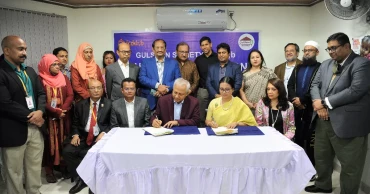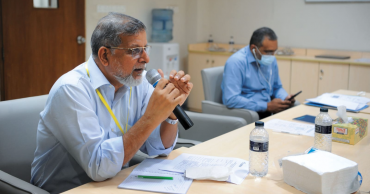icddr,b
EBL, icddr,b join hands for sustainable healthcare waste management
Eastern Bank PLC (EBL) and icddr,b have joined forces in a pioneering initiative to advance healthcare waste management through sustainable and environmentally-friendly practices.
The partnership was formalised with the signing of a Memorandum of Understanding (MoU) at EBL's head office in Dhaka on Wednesday.
Gas crisis grips Narayanganj; residents being forced to adapt to alternative options for cooking
The new partnership with Eastern Bank PLC will enable icddr,b to establish a state-of-the-art solid biohazardous waste treatment facility.
This facility will be equipped with advanced waste sterilizers and shredders, allowing for the complete decontamination and destruction of biohazardous polymer products, said a press release.
This initiative paves the way for recycling polymer materials, thereby converting waste into an asset and significantly reducing environmental impact of waste management.
Workshop on vitamin-fortified safe edible oil held in Dhaka
Dr Shams El Arifeen, Acting Executive Director and Senior Director, Maternal & Child Health Division at icddr,b, said, "This collaboration with Eastern Bank PLC is a testament to the importance of corporate responsibility in fostering sustainable healthcare practices. It marks a crucial step towards a more eco-friendly approach in healthcare waste management."
Ali Reza Iftekhar, Managing Director and CEO of EBL said, ‘Solid biohazardous medical waste poses a significant challenge for Bangladesh and the management of medical waste is still in its early stages. We are very happy to partner with icddr,b in this timely initiative. “
Koko’s 9th death anniversary observed
The project aims to promote similar initiatives across Bangladesh, with icddr,b hosting workshops and seminars to share its expertise in sustainable waste management with healthcare leaders and government officials.
2 years ago
Collaborative efforts can prevent diarrhoea outbreaks in Rohingya population: icddr,b
Icddr,b and UNICEF on Sunday jointly organised a dissemination seminar to highlight the activities of the project titled “Emergency Healthcare (Acute Watery Diarrhoea-AWD preparedness and response) and Sentinel Cholera Surveillance in Forcibly Displaced Myanmar Nationals (FDMN) camps and host communities in Cox's Bazar.”
The seminar was held at Long Beach Hotel, Cox’s Bazar and was attended by a diverse group of stakeholders, including government officials, development partners and NGOs.
Dr Baharul Alam, co-principal investigator and Head of Hospitals at icddr,b, presented the project's overview and informed about a rapid joint field assessment conducted by icddr,b and UNICEF after the Rohingya population fled persecution in Myanmar and sought refuge in Bangladesh in August 2017.
The project aims to prevent diarrheal outbreaks through disease surveillance, treatment, capacity building and vaccination. icddr,b established five diarrheal treatment centres (DTC) in Teknaf with UNICEF's support, which helped manage an AWD outbreak in September 2019.
Since 2018, icddr,b has trained 2,000 healthcare providers with the collaboration of UNICEF and the World Health Organization (WHO).
The Leda DTC continues to operate, treating around 3,500 patients yearly and participating in the joint assessment team led by WHO.
Dr ASG Faruque, emeritus scientist at icddr,b presented the findings of the DTC-based diarrhoeal diseases surveillance and informed that FDMN children had shown significant improvements in stunting, underweight, and wasting.
Over the last five years, chlorinated tap water, use of toilets, ORS and vaccination coverage have also increased significantly in the Rohingya communities. Dr Ashraful Islam Khan, Scientist at icddr,b presented on the cholera sentinel surveillance, which has been underway in partnership with the Institute of Epidemiology, Disease Control and Research (IEDCR) and supported by UNICEF.
He informed that the surveillance has been instrumental in finding appropriate strategies and providing necessary directives for controlling cholera outbreaks in the camps.
Dr Firdausi Qadri, Acting Senior Director, Infectious Disease Division at icddr,b, presented the success of oral cholera vaccination campaigns in a complex humanitarian crisis setting in Cox's Bazar. She informed that seven rounds of cholera vaccination campaigns in the Rohingya camps have resulted in high levels of coverage, reaching 100% in some settings.
About 900,000 Rohingya people received 3,765,499 vaccine doses, and 528,297 individuals living in close proximity to the FDMNs in the host communities received 895,688 doses of OCVs.
The vaccine was well accepted, demonstrating the feasibility of delivering oral cholera vaccine (OCV) in complex refugee settings.
She said, “These oral cholera vaccination campaigns among Rohingya and the host population have been successful in preventing cholera outbreaks and epidemics in the area, as evidenced by the absence of major outbreaks. This has been achieved by the dynamic leadership and support from RRRC, CDC-DGHS, IEDCR, WHO, UNICEF, and other partners.”
The presentations were followed by remarks from Dr Mainul Hasan, Health Specialist at UNICEF and Dr Jorge Martínez, WHO, Cox’s Bazar, as well as speeches from special guests, Dr Md Mahbubur Rahman, Civil Surgeon, Cox's Bazar and Mohammed Miznur Rahman, Refugee, Relief and Repatriation Commissioner, Government of Bangladesh, and the Chair Dr Tahmeed Ahmed, Executive Director at icddr,b.
Dr Hasan appreciated icddr,b and said, “UNICEF is proud to be a part of this successful journey of controlling acute watery diarrhoeal disease in the Rohingya setting. The works need to be continued, and we believe we will be able to keep the diseases checked together.”
Dr Martinez, in his address, highlighted the importance of disease surveillance, vaccination and other measures and requested icddr,b to explore ways to help strengthen local capacities in Cox’s Bazar for rapid diagnosis of diseases.
Dr Tahmeed Ahmed commended the collaborative efforts of the government and development partners, stating, "The collaborative effort not only prevented any diarrhoeal outbreaks from occurring and saving lives, but it also generated a great deal of evidence that will be useful in other parts of the world for managing humanitarian crises."
Despite the success so far, it is clear that sustained efforts are needed to prevent future outbreaks in the camp settings. Along with vaccination, strong and sustainable water, sanitation and hygiene intervention, a comprehensive surveillance system, and proper case management are necessary to prevent diarrhoeal outbreaks in humanitarian crisis settings.
The successful vaccination campaigns demonstrate the importance of a multi-sectoral approach in addressing the complex health challenges faced in refugee camps.
The partnerships and collaboration between humanitarian organisations, local authorities, and the community have been essential in achieving these results.
2 years ago
New study shows a single two-gram oral dose of azithromycin at normal birth can reduce 33% maternal sepsis, deaths
A recent multicountry study called Azithromycin Prophylaxis in Labor Use Study (A-PLUS) has found that a single dose of two-gram azithromycin antibiotic taken orally during vaginal delivery, commonly known as normal delivery, can significantly reduce the risk of maternal sepsis or death.
Sepsis is a severe medical condition that occurs when the body responds excessively to an infection, which can result in multiple organ failures and death.
The findings of the study have recently been published in the New England Journal of Medicine.
The study was conducted by the Global Network for Women's and Children's Health Research of the Eunice Kennedy Shriver National Institute of Child Health and Human Development (NICHD) of which icddr,b is a partner.
The A-PLUS trial enrolled women in labour from Bangladesh, the Democratic Republic of the Congo, Guatemala, India, Kenya, Pakistan, and Zambia.
Between September 2020 and August 2022, 29,278 women were randomised to receive either azithromycin or a placebo.
The risk of maternal sepsis or death was 33% lower in the azithromycin group compared to the placebo (look-alike dummy, which does not contain the study drug) group.
The difference in the outcome was mainly due to the lower occurrence of sepsis in the azithromycin group than in the placebo group.
Additionally, women receiving azithromycin were less likely to develop infections, including endometritis (infection of the lining of the womb), wound infections, and urine infections.
Women receiving azithromycin also had fewer hospital readmissions and unscheduled healthcare visits compared to the placebo group.
The findings from interim analysis of the study were so impactful that one of the trial sites (Democratic Republic of the Congo) stopped enrolling new participants early to ensure that as many women as possible could benefit as soon as possible.
However, the study could not find azithromycin to have any impact on neonatal sepsis or death. It is also to be noted that azithromycin has been in use for caesarean delivery to prevent and manage infections.
The Bangladesh site of the study was co-led by Dr Rashidul Haque, an Emeritus Scientist and Sk Masum Billah, an Associate Scientist at icddr,b and Dr William Petri at the University of Virginia, USA.
Commenting on the implication of the study Dr Haque said that in Bangladesh, where about two out of three deliveries are normal, a single dose of two-gram azithromycin given during labour as a preventive measure can help saving many lives.
He hopes that healthcare providers and policymakers will consider using azithromycin as a preventive measure during vaginal deliveries.
These findings have the potential to change clinical practice by providing a safe, effective and low-cost approach to reduce the global burden of maternal sepsis and death, said Diana W. Bianchi, M.D., director of NIH’s Eunice Kennedy Shriver National Institute of Child Health and Human Development (NICHD), the primary funder of the trial.
“We urgently need effective strategies to prevent pregnancy-related infections, which account for roughly 10% of maternal deaths worldwide.”
The study also found that azithromycin was not associated with an increased risk of adverse events. The researchers hope that their findings will inform the development of new strategies to prevent maternal sepsis and death.
This multi-site study was conducted by NICHD's Global Network for Women's and Children's Health Research and was co-funded by NICHD and the FNIH, with support to FNIH provided by a grant from the Bill & Melinda Gates Foundation.
3 years ago
Icddr,b opens specimen collection booth inside Gulshan Lake Park
Icddr,b Diagnostic Laboratories opened a specimen collection booth inside Gulshan Lake Park in Dhaka in partnership with the Gulshan Society Thursday.
The specimen collection booth inside Gulshan Lake Park will operate from 7am to 2pm every day, throughout the year. Anyone will be able to use the specimen collection booth by walking in, without any prior appointment.
Barrister Sarwat Siraj, secretary general of Gulshan Society, Dr Tahmeed Ahmed, executive director of icddr,b and Dr Dinesh Mondal, acting senior director of the laboratory sciences and services division of icddr,b, inaugurated the booth.
A memorandum of understanding (MoU) was signed between icddr,b and Gulshan Society on the occasion.
Read: icddr,b, B-SCAN to initiate WASH assessment for people with disabilities, older people
Sarwat said: "Gulshan Society is committed to ensuring community engagement in all our activities. This collaboration will bring world-class services of icddr'b to the doorstep of Gulshan residents."
Dr Tahmeed said, "This specimen collection booth is a reaffirmation of icddr,b's commitment to helping strengthen the healthcare services of Bangladesh. We are very grateful to Gulshan Society for providing us with this wonderful facility for specimen collection, which I know will help this community greatly."
3 years ago
Hydrocele surgery: Economic benefit outweighs cost by 15 times
The economic benefit of hydrocele surgery outweighs the cost by 15 times, said International Centre for Diarrhoeal Disease Research, Bangladesh (icddr,b) on Monday.
It noted that patients with scrotal swelling, known as hydrocele are highly neglected, often socially excluded and deserve support.
icddr,b researchers conducted an outcome evaluation that showed that surgery had a significant impact on these patients' social and economic participation.
The surgical intervention is highly cost-effective (1:15), meaning the economic benefit of the surgery outweighs the cost of surgery by 15 times.
Moreover, these patients are now capable of working for more hours than before, averting their Disability Adjusted Life Years (DALYs).
icddr,b organised a dissemination seminar on Monday to share findings of a recently concluded project titled "Ensuring Health Equity and Economic Participation for Chronic Lymphatic Filariasis Patients through Surgical Intervention in Bangladesh."
Read: Excessive Crying in Infants: Possible Reasons, Tips of Soothing
It was held at icddr,b's traction meeting room in Mohakhali.
Filariasis is a parasitic disease transmitted to humans through culex mosquito bites. Swelling of the affected limb followed by fever episodes is the disease's main symptom, which in the long run may cause the person various degrees of disabilities.
Filariasis is also manifested by extensive scrotal swelling, known as hydrocele.
In 10 northern endemic districts of Bangladesh, about 25 thousand suspected cases of hydrocele patients live.
They feel ashamed of seeking healthcare due to social stigma. Additionally, many of these patients cannot afford the cost of hydrocele surgery, leading them to remain excluded from mainstream socio-economic activities.
Since 2022, with support from Bangladesh Bank, icddr,b has provided surgical support with the help of local government hospitals to 203 patients with hydrocele.
Of these, 145 are from Rangpur, and 58 are from Kurigram Districts. Previously with support from the Foreign, Commonwealth and Development Office, UK, from 2020 to 2021, icddr,b helped 838 hydrocele patients return to normal life with hydrocele surgery.
3 years ago
Icddr,b, IEDCR launch environmental surveillance of Covid
The Environmental Interventions Unit of icddr,b and the Epidemiology, Disease Control and Research (IEDCR) Wednesday launched an initiative to undertake environmental surveillance of Covid-19 and enteric pathogens in Dhaka and the Rohingya camps.
Under the initiative, wastewater samples will be collected from selected spots comprised of drains, canals, and pumping stations in selected areas of Dhaka city and the Rohingya camps to track and monitor four vaccine-preventable pathogens including Salmonella typhi, Vibrio cholerae, Rotavirus of enteric pathogen and Covid in the communities.
The benefit of environmental surveillance is multifaceted – it is highly cost-effective and supplementary to the clinical surveillance system, it provides early warnings, and the data generated are free from bias by healthcare access or healthcare behaviour.
Also, it is effective in both symptomatic and asymptomatic infections, and evidence from environmental surveillance can be helpful for planning public health emergency responses – including in health communications, health facility preparedness, and vaccination campaigns.
Environmental surveillance relies on wastewater samples, and helps track pathogens in circulation in the population, including their presence or absence, trends in concentrations, and generates an early warning, among others.
A few low- and middle-income countries, including Pakistan and India, have deployed environmental surveillance for different diseases and successfully detected silent outbreaks – meaning a disease that otherwise would have gone unnoticed.
The environmental surveillance initiative in Bangladesh will be implemented in cooperation with the Dhaka North City Corporation, Dhaka South City Corporation, Dhaka Water Supply and Sewerage Authority in Dhaka, the Department of Public Health Engineering, Refugee, Relief and Repatriation Commissioner, and Cox's Bazar Civil Surgeon Office.
3 years ago
50% of deaths among children admitted to hospital happen after discharge: Study
Mortality among children with acute illness in low-income and middle-income settings remains unacceptably high, according to a recent study by the Childhood Acute Illness and Nutrition (CHAIN) Network.
Among diverse sites in Africa and South Asia, almost half of child mortality occurs following hospital discharge, it finds.
Young children in sub-Saharan Africa and South Asia who become sick or malnourished continue to have a high risk of death in the six months after being hospitalised.
The study of 3,101 acutely ill children at nine hospitals in six countries across sub-Saharan Africa and South Asia found that 48 percent of the 350 deaths recorded occurred within six months after discharge from the hospital.
"The finding that many children die after being discharged from hospital is tragic. This calls for a review of the treatment guidelines and for home-based interventions to prevent these unfortunate deaths," said Dr Tahmeed Ahmed, executive director of icddr,b (formerly International Centre for Diarrhoeal Disease Research, Bangladesh) and one of CHAIN's lead researchers.
3 years ago
Canadian envoy lauds icddr,b’s research works, innovations
Canadian High Commissioner to Bangladesh Dr Lilly Nicholls has said she is impressed by the volume of public health research of icddr,b and how easily the research gets translated to low-cost solutions.
Dr Lilly Nicholls paid her first visit to International Centre for Diarrhoeal Disease Research, Bangladesh (icddr,b) at Mohakhali on Wednesday.
She commended the incredible partnership between icddr,b and Canada that spans over two decades.
3 years ago
icddr,b lab opens sample collection centre in Uttara
icddr,b Diagnostic Laboratories Thursday launched its sample collection centre in the city’s Uttara area.
icddr,b’s executive director Dr Tahmeed Ahmed and acting senior director of the Laboratory Sciences and Services Division Dr Dinesh Mondal inaugurated the sample collection centre on the third floor of SH Properties, House 35, in Sector 14.
The Uttara sample collection centre will operate from 7.30 am to 7.30 pm daily.
READ: icddr,b team pays homage to Bangabandhu
However, individuals willing to undergo test for Covid-19 will have to visit its Mohakhali Centre.
Speaking on the occasion, Dr Tahmeed underscored the importance of quality and accessibility of laboratory tests for effective disease detection and treatment.
“icddr,b is committed to help strengthen the healthcare services of Bangladesh with its internationally accepted laboratory tests, which is the cornerstone of effective disease control and prevention efforts," he said.
On his part, Dr Dinesh said, “This sample collection centre will benefit not only the residents of Uttara but also those living in the nearby areas, including Tongi and Gazipur, in receiving icddr,b’s reliable laboratory testing service and help in disease detection.”
READ: 27% 'Suchana' beneficiaries reach food security: icddr,b
The funds generated from icddr,b’s diagnostic service supports the free of cost treatment of more than 200,000 patients annually at icddr,b’s two hospitals, located in Dhaka and Matlab upazila in Chandpur, respectively.
icddr,b Diagnostic Laboratories is the first ISO15189 (Quality) and ISO15190 (Safety) accredited laboratory in Bangladesh.
4 years ago
5 more Omicron cases detected in Bangladesh
The cases of Omicron variant of Covid-19 have jumped to 69 in Bangladesh, with five more infections detected till Sunday, according to GISAID, a primary source that provides open access to genomic data of Coronavirus.
The latest cases were detected at the virology lab of the Dhaka-based international health research institute icddr,b.
On January 20, nine more cases were found to be Omicron positive, pushing the tally of the new Coronavirus variant, through highly time-consuming and scarcely available genomic sequencing, to 64.
Scientists can confirm if a case is positive with Omicron or Delta by looking closely at the genetic material provided through testing.
Bangladesh reported its first two Omicron cases on December 11 last year in two members of the Bangladesh women's cricket team that had been forced to return early from the ICC Women's World Cup qualifiers in Zimbabwe, deep in southern Africa, where the most transmissible variant of SARS-CoV-2 till now is believed to have originated.
Doctors in South Africa, the continent's most developed country, were the first to alert the world of this new variant.
Omicron is gradually replacing Delta through community transmission in Bangladesh, the Directorate General of Health Services (DGHS) said Sunday.
The variant is spreading at the community level, and its symptoms have similarities with that of seasonal flu, DGHS spokesperson Dr Md Nazmul Islam said.
4 years ago








.jpg)
.jpg)





